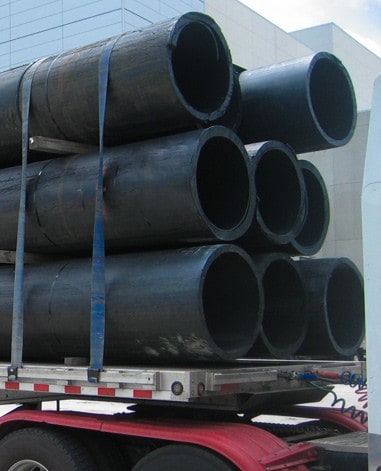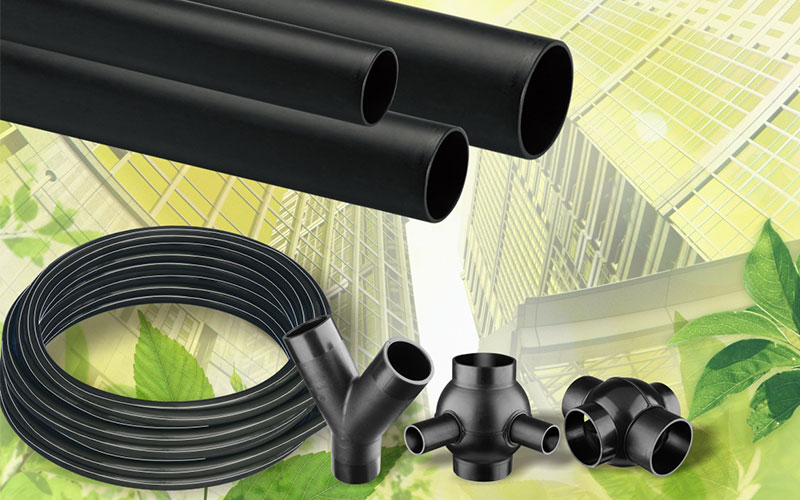Why Texas hdpe pipe manufacturer Is Setting Standards in Advanced Pipe Solutions
Wiki Article
Comprehending the Key Benefits of HDPE Pipe for Water and Wastewater Management
Making use of HDPE pipeline in water and wastewater management provides various advantages that warrant consideration. Its phenomenal sturdiness and long life expectancy make it a preferred selection for several jobs. Furthermore, the product's resistance to deterioration and chemical damage boosts its reliability in numerous settings. The benefits extend past just durability and resistance. American Plastics HDPE Pipe Manufacturing. Exploring its cost-effectiveness and environmental influence reveals much more engaging factors for its prevalent adoption in contemporary infrastructureExceptional Resilience and Durability

HDPE pipeline stands apart for its phenomenal durability and long life, making it a preferred choice in water management systems. Built from high-density polyethylene, these pipelines can endure considerable stress and tension, making sure reliable efficiency gradually. Their durable nature enables them to sustain extreme environmental conditions, consisting of temperature changes and soil movements, which can create various other products to fail.
The life-span of HDPE pipes often surpasses 50 years, providing an affordable service for communities and sectors alike. In addition, the material's lightweight residential or commercial properties streamline installation, reducing labor prices and timeframes. This resilience minimizes the requirement for frequent fixings or substitutes, even more boosting its financial allure.
In water administration applications, the integrity of HDPE pipes means fewer disturbances and enhanced solution continuity, making them indispensable to sustainable framework growth. The combination of durability and durability strengthens HDPE's function as a keystone in effective water administration solutions.

Resistance to Corrosion and Chemical Damages
While many materials yield to corrosion and chemical damage gradually, HDPE pipelines display impressive resistance, making them perfect for different water administration applications. This resilience stems from the molecular structure of high-density polyethylene, which is inherently non-reactive and does not rust like steels or weaken from exposure to harsh chemicals. As a result, HDPE is extremely efficient in atmospheres with hostile materials, such as wastewater systems that may include acids, bases, and organic solvents.
Furthermore, HDPE pipes can stand up to ecological variables such as dirt level of acidity and saline problems, better boosting their viability for varied applications (Pipe Manufacturing Midland TX). Their capacity to preserve structural stability with time minimizes the risk of leakages and failures, which is crucial in ensuring the security and reliability of water circulation and wastewater monitoring systems. As a result, the resistance to corrosion and chemical damage noticeably adds to the total effectiveness and longevity of HDPE piping solutions
Cost-Effectiveness and Economic Advantages
When thinking about the economic implications of water management systems, the cost-effectiveness of HDPE pipes becomes evident. These pipelines use lower installment and maintenance prices compared to conventional products like steel or concrete. Their light-weight nature simplifies transportation and setup, causing reduced labor expenses. Additionally, HDPE pipes show a lengthy life-span, often exceeding 50 years, which converts to fewer substitutes and lasting savings.Furthermore, the resistance of HDPE to deterioration and chemical damage reduces the requirement for expensive repair work and replacements. The pipes also sustain reliable water circulation, lowering power prices related to pumping systems. By alleviating leakages and water loss, HDPE pipes add to considerable financial advantages for municipalities and markets alike. On the whole, the initial investment in HDPE piping can yield significant economic returns over the life-span of the water management system, making it a sensible selection for lasting framework development.
Ecological Sustainability and Lowered Impact

Convenience and Flexibility in Setup
As a result of their special properties, HDPE pipelines offer impressive adaptability and versatility in setup, making them suitable for a wide variety of applications. Their light-weight nature permits simpler handling and transportation, lowering labor costs and installment time. HDPE pipes can be curved and formed to fit different terrains and task requirements, which is especially advantageous in testing settings.Additionally, their resistance to corrosion and chemical damage permits installment in diverse settings without the requirement for specialized safety layers. The ability to fuse joints produces a continual, leak-free system, boosting the overall stability and reliability of the installation. HDPE's flexibility likewise fits ground activity, decreasing the danger of damages in locations vulnerable to changing soil. Overall, these qualities make HDPE pipes not just versatile but also a favored option for water and wastewater monitoring systems.
Regularly Asked Inquiries
Exactly How Does HDPE Pipe Compare to PVC in Water Management Applications?
HDPE pipe offers superior flexibility, resistance to corrosion, and sturdiness compared to PVC. Its lighter weight assists in much easier setup, while its long lifespan lowers substitute expenses, making HDPE a favored choice in water administration applications.What Is the Life Expectancy of HDPE Pipes Under Regular Problems?
Under normal conditions, HDPE pipes can have a life expectancy ranging from 50 to 100 years. Their toughness and resistance to rust add to their lasting efficiency in numerous applications, making them a trustworthy option for infrastructure.Are HDPE Piping Recyclable After Their Life Span?
Yes, HDPE pipes are recyclable after their life span. hdpe pipe suppliers Midland TX. They can be processed and repurposed into brand-new products, greatly lowering ecological impact and promoting sustainability within the industry, making them an environmentally friendly choice for piping solutionsWhat Is the Setup Refine for HDPE Water Lines?
The installment process for HDPE pipes includes website preparation, trenching, pipe blend or mechanical joining, backfilling, and pressure screening. Proper methods assure a resilient and reliable system for transferring water and wastewater properly.Can HDPE Pipes Be Utilized for Both Safe And Clean and Non-Potable Water Systems?
Yes, HDPE pipes can be utilized for both drinkable and non-potable water supply. Their versatility, toughness, and resistance to deterioration make them suitable for various applications, guaranteeing risk-free and reliable transportation of water in various contexts.Report this wiki page